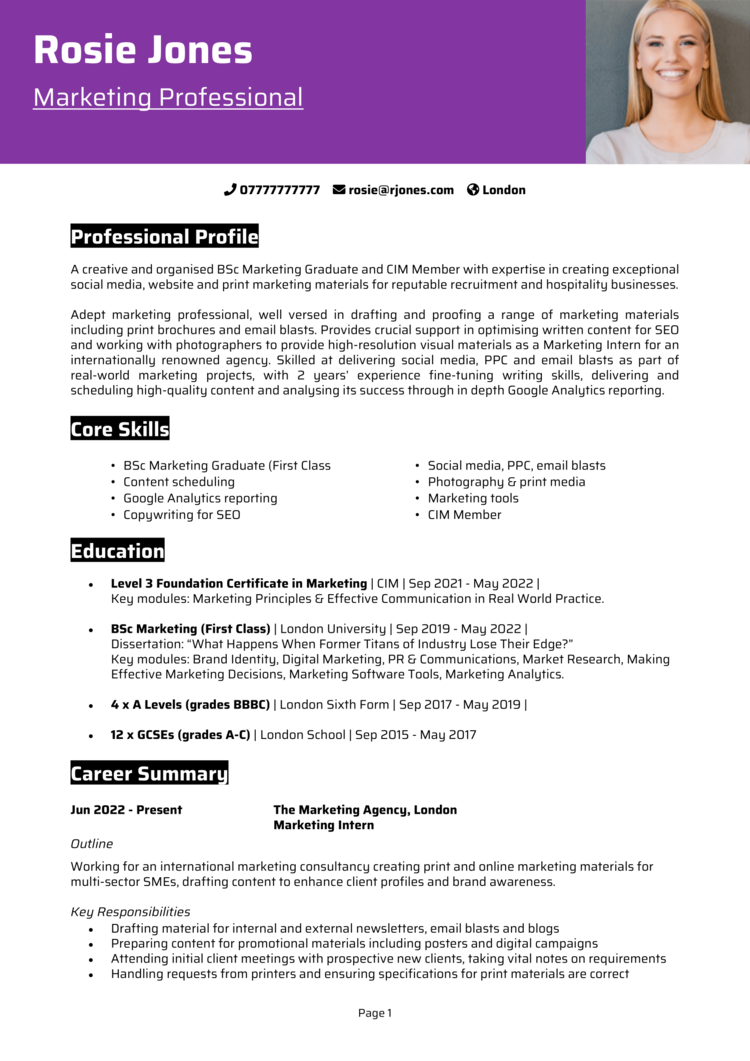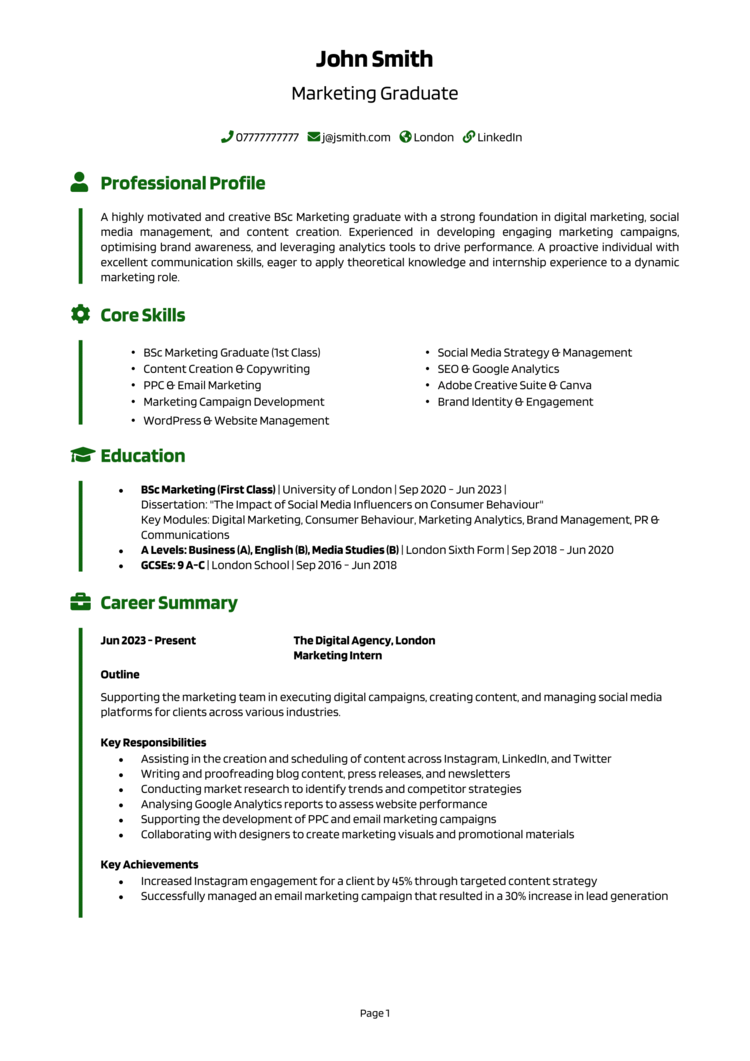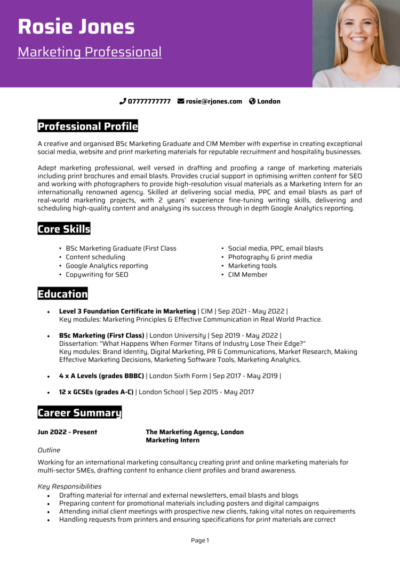Through your academic studies, you’ve mastered the art of digital marketing. Now, it’s time to apply those skills in the real world.
But landing your first marketing job takes more than just a degree. Employers want creative, analytical thinkers who can turn insights into campaigns and engagement into conversions.
This guide and its Marketing Graduate CV examples will help give you the best chance of landing that first step in your career.
Marketing Graduate CV example

Marketing Intern CV example

How to write your Marketing Graduate CV
Learn how to create your own interview-winning Marketing Graduate CV with this simple step-by-step guide.
Marketing is all about standing out in a crowded space – your CV should do the same. Even if you’ve got no work experience, this guide will help you showcase your education, past experience, and transferable skills in a way that proves you have what it takes to succeed in the field. By the time you’re done, your CV will be just as compelling as the campaigns you hope to create.
How to create a good structure for your Marketing Graduate CV


Employers don’t expect graduates to have years of experience, but they do want to see initiative, creativity, and a solid understanding of marketing principles. A coherent structure ensures your key skills and education stand out at a glance, without forcing recruiters to struggle to find it.
Here’s how to organise your CV layout effectively:
- Name and contact details – These contact details sit at the top to provide easy access for prospective employers.
- Personal profile – Hook the recruiter right away by stating the value you’ll bring their company and your career aspirations.
- Core skills – State your best qualities at a quick glance, such as social media strategy, content creation, and data analysis.
- Work experience – List any relevant internships, placements, freelance projects, or part-time jobs with transferable skills.
- Education – Show off your degree, relevant coursework, and any additional certifications or training.
- Additional info – Include anything from your hobbies and interests to your portfolio.
Marketing Graduate CV format


A cluttered CV format won’t help you land your first job – just like an unstructured marketing campaign, it’ll fail to get the right message across. Don’t bury your promising expertise underneath formatting mistakes – keep things nice and easy for busy recruiters.
Follow these formatting tips:
- Bullet points – Break down information so it’s clear and skimmable.
- Divide sections – Ensure each section is easy to find and well-structured.
- Use a clear and readable font – Along with an appropriate colour scheme, ensure your font is easy for the recruiter to read.
- No more than 2 pages – Too long would start to bore the recruiter, and this is plenty of length to list the important details.
The best way to write a Marketing Graduate CV profile


Your profile is your chance to make a strong first impression. As a graduate, this section should highlight your academic background, key skills, and aspiration to grow in the field of marketing. Ultimately, you need to convince recruiters to not only read the rest of your CV, but that hiring you would benefit their company.
Marketing Graduate CV profile examples
Profile 1
Ambitious Marketing Graduate with a strong foundation in digital marketing, brand management, and market research. Skilled in social media strategy, content creation, and campaign analytics. Proficient in Google Analytics, HubSpot, and Adobe Creative Suite. Eager to apply marketing knowledge in a dynamic environment and contribute to business growth through innovative strategies.
Profile 2
Creative and data-driven Marketing Graduate with experience in social media management, email marketing, and content strategy through internships and freelance projects. Skilled in SEO, paid advertising, and audience engagement. Proficient in using Google Ads, Mailchimp, and Canva. Passionate about brand storytelling and consumer behaviour insights.
What to include in your Marketing Graduate CV profile
Here’s what to include:
- Marketing degree or specialisation – Mention your field of study and key areas of expertise.
- Key marketing skills – Focus on digital marketing, content creation, SEO, or analytics.
- Practical experience – Highlight any internships, university projects, or freelance work.
- Creative and analytical mindset – Employers want candidates who understand both strategy and execution.
- Career aspirations – Show enthusiasm for the industry and your willingness to learn.
Core skills section


Marketing is a blend of creativity and strategy, and this section should reflect that balance.
Since you may not have extensive work experience yet, focus on skills you’ve developed through coursework, internships, or personal projects. If you’ve worked with marketing tools like Google Analytics, Canva, or Hootsuite, highlight them here.
Tailor your skills to the specific job you’re applying for – whether it’s digital marketing, social media, or content creation. Employers want candidates who can hit the ground running, so even self-taught skills can be valuable.
Essential skills that recruiters look for in a Marketing Graduate CV
- Market Research and Analysis – Conducting research on industry trends, consumer behaviour, and competitor strategies to inform marketing decisions.
- Content Creation and Copywriting – Writing engaging content for blogs, social media, and marketing materials to attract target audiences.
- Social Media Marketing – Managing and scheduling content across platforms like LinkedIn, Instagram, and Facebook to increase brand engagement.
- SEO and Digital Advertising – Understanding search engine optimisation (SEO) principles and assisting in paid advertising campaigns.
- Email Marketing – Creating and managing email campaigns using platforms like Mailchimp or HubSpot to nurture leads and increase conversions.
- Marketing Analytics and Reporting – Using tools like Google Analytics and social media insights to track campaign performance and measure ROI.
- Brand Management – Supporting the development and execution of brand strategies to maintain consistency and appeal.
- Event Coordination – Assisting in the planning and promotion of marketing events, product launches, and sponsorships.
- Marketing Software Proficiency – Gaining experience with CRM systems, marketing automation tools, and design software like Canva or Adobe Creative Suite.
- Campaign Coordination – Supporting marketing teams in executing promotional campaigns and monitoring their effectiveness.
Structuring your education section


Your degree is one of your strongest assets as a marketing graduate, so make sure it’s clearly presented. As a junior candidate, you should expand upon specific modules that you feel are especially pertinent for the role, detailing how they’ve instilled the skills that make you the right fit.
Highlight any additional certifications, such as Google Digital Garage or HubSpot Content Marketing, to show your proactive education.
Example education sections
Education 1
First Class BA (Hons) Marketing & Digital Communications | University of Manchester | 2020–2023
Modules included Consumer Behaviour, Social Media Marketing, and Data-Driven Strategy. Led a group project on influencer marketing, resulting in a case study published by the department. Completed a dissertation on the impact of AI on personalised advertising, achieving a distinction.
3x A-Levels (A-B) | Birmingham Sixth Form College | 2018–2020
9x GCSEs (A*-C) | Birmingham High School | 2016–2018
Education 2
Upper Second Class BA (Hons) Marketing & Brand Management | University of Leeds | 2019–2022
Modules included Market Research, Brand Strategy, and Digital Advertising. Designed a marketing campaign for a start-up business as part of a live industry project. Completed a final-year thesis on sustainable branding and consumer perception, earning high praise from faculty.
BTEC Level 3 Extended Diploma in Business (D*D*D) | Manchester City College | 2017–2019
10x GCSEs (A*-C) | Manchester Academy | 2015–2017
What to include in your education section
For each qualification, add the following info:
- Qualification & organisation – State what you studied and where.
- Dates studied – Say when you earned the qualification
- Extra details – Provide some detail on more specific modules that are pertinent to the role, highlighting the skills you learned on the course.
Best qualifications for Marketing Graduates
- BA/BSc in Marketing, Digital Marketing, or Business – The foundation for most marketing careers.
- Google Digital Garage Certification – Provides fundamental digital marketing skills.
- HubSpot Content Marketing Certification – Great for candidates interested in content creation.
- Hootsuite Social Media Marketing Certification – Demonstrates social media expertise.
- Google Analytics Certification – Essential for roles involving data analysis and campaign tracking.
Work experience


Lucky for you, writing a CV as a marketing graduate isn’t just about job titles – it’s about demonstrating your ability to apply marketing concepts in real-world situations.
Even if you haven’t held a formal marketing role, highlight any internships, university projects, or freelance work where you’ve used your skills. Have you managed social media for a student society? Created a content strategy for a local business? Designed a marketing campaign for a coursework project? This is all work experience that counts.
If your experience is outside of marketing, focus on transferable skills. Retail or hospitality jobs, for example, can demonstrate communication, teamwork, and customer engagement – all valuable for a marketing role.
How to format previous jobs in your CV correctly

- Outline – Describe the company, university project, or freelance work you were involved in.
- Key responsibilities – Outline the tasks you performed, using action words like “developed”, “managed”, and “researched”.
- Key achievements – Demonstrate impact with measurable outcomes, such as engagement growth, increased website traffic, or improved branding.
Example jobs for Marketing Graduates
Marketing Intern | Finest Media
Outline
Gained hands-on experience in digital marketing by assisting an internet marketing agency with campaign execution, social media management, and market research.
Responsibilities
- Created and scheduled social media posts across multiple platforms, increasing audience engagement.
- Assisted with SEO optimisation by conducting keyword research and updating website content.
- Analysed campaign performance using Google Analytics and prepared reports for senior marketers.
- Supported email marketing campaigns, helping segment audiences and track open rates.
- Researched competitor marketing strategies to provide insights for future campaigns.
Achievements
- Increased social media engagement by 20 percent through improved content planning.
- Helped optimise PPC campaigns, reducing cost-per-click by 15 percent.
- Recognised for delivering detailed market research that influenced campaign strategy.
Marketing Assistant (placement) | UltiRetailers
Outline
Worked alongside the marketing team at a retail company to support brand promotion, content creation, and digital marketing initiatives.
Responsibilities
- Assisted in creating promotional materials for product launches and marketing campaigns.
- Helped manage influencer collaborations, tracking engagement and campaign performance.
- Wrote and edited blog posts, social media content, and email newsletters.
- Tracked website traffic and social media metrics to assess campaign effectiveness.
- Coordinated logistics for marketing events, ensuring smooth execution.
Achievements
- Increased website traffic by 25 percent by optimising blog content and improving SEO.
- Helped manage a successful influencer campaign that boosted brand awareness.
- Received positive feedback from the marketing team for creativity and attention to detail.
Additional info


Junior candidates would benefit from this optional section, which expands on anything else that helps to convey your fit.
This could include hobbies like running a marketing blog, or awards you’ve won during your studies.
Good additional info for Marketing Graduate
- Hobbies – Activities that involve creativity, strategic thinking, or communication, such as blogging, social media management, or graphic design, can highlight relevant marketing skills.
- Volunteering – Experience in event planning, social media promotion for charities, or assisting small businesses with marketing efforts can demonstrate initiative and practical skills.
- Awards and Achievements – Recognition for projects, academic performance, or competitions can showcase a strong work ethic and creativity.
- Extracurricular Activities – Participation in student organisations, marketing societies, or university-led projects can highlight teamwork, leadership, and industry engagement.
- Certifications and Training – Courses in digital marketing, SEO, analytics, or social media strategy can reinforce practical knowledge and technical skills.
Additional info example
Additional info
Hobbies
Social media marketing – Grew a personal Instagram page to 5,000+ followers through organic engagement strategies.
Content creation – Created blog posts on consumer trends and marketing strategies, refining research and writing skills.
Graphic design – Designed promotional materials for university events using Canva and Adobe Illustrator.
Awards and Achievements
Best Digital Marketing Project – Won first place for a campaign pitch in a university competition.
Dean’s List – Recognised for outstanding academic performance in marketing and business modules.
Extracurricular Activities
Marketing Society member – Attended industry talks and workshops on branding, digital strategy, and advertising.
Business case competition – Worked in a team to develop a market entry strategy for a startup, presenting to industry professionals.





